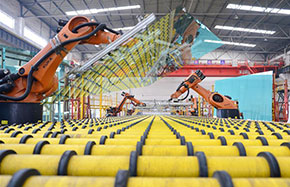Domestic film industry booms in China
Raymond Zhou said, "These young filmmakers have more solid techniques in film narrative. That is very new, because in the old times, film makers tend to look down upon those techniques and say that this is something that belongs to Hollywood. But in the new and young directors they don't see it that way, they see a technique as a technique and you can use it for your own good."
3D: Double-edged sword
3D is another clear-cut issue when it comes to the Chinese movie market. China has the most 3D screens in the world. The usual practice in most countries is to screen both the 2D and 3D versions, but in China, only the 3D version is released. Disgruntled customers are left with no choice but to pay more to have a 3D experience. What's more, despite the 3D propaganda, very few are actually shot in 3D resulting in lower quality films.
Raymond Zhou said, "I feel that 3D technology is a double-edged sword. To convert those films from 2D to 3D is actually a lazy and cheap way to make a quick buck."
Dilemma of protection
In June, the release of Jurassic Park 3D and Fast and Furious 6 were postponed while domestic blockbuster "Switch" did hit screens. The popular Dreamworks animation "Croods" was also suddenly called off due to "contractual reasons" while domestic animations "Kuiba" and "The Adventures of Sinbad" WERE released. It's an open secret that the month for domestic film protection is here.
Raymond Zhou said, "The government agency that is doing that is playing the role of God that can not actually give you the rationale or the reason why it’s feasible and necessary. So it's quite random. I think that a more healthy and sound system of protection should be ironed out and all domestic movies should in a way be benefited from that."
Long way to go
A statistic that will frustrate those who sing the praises of Chinese domestic film is that in 2012, 75 films were sold overseas taking a disappointing 1 billion yuan at the box office. So although China makes more than 700 feature films each year, it doesn't currently have a lucrative overseas market. So while figures at home seem positive, it seems that Chinese film still has some renegotiations to make overseas to raise its profile at an international level.



















